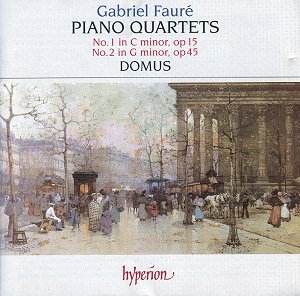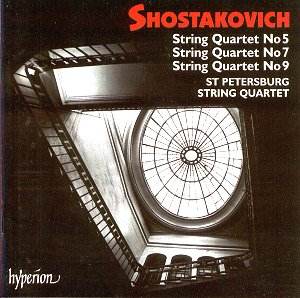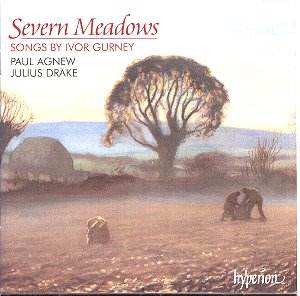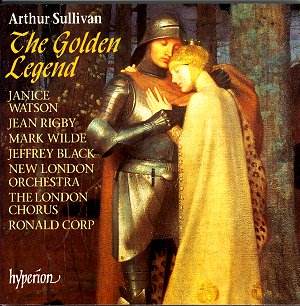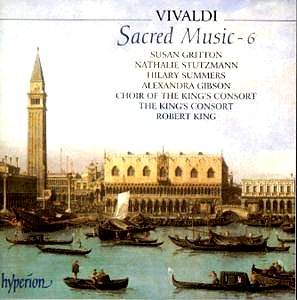 Composer: ANTONIO VIVALDI (1678-1741)
Composer: ANTONIO VIVALDI (1678-1741)
Works: Sacred Music Vol. 6: Beatus vir RV795, Salve Regina RV617, Laudate Dominum RV606, In exitu Israel RV604, Nisi Dominus RV608
Performers: Susan Gritton (sop), Nathalie Stutzmann, Hilary Summers, Alexandra Gibson (con), Choir Of The King’s Consort, The King’s Consort / Robert King
Recording: St Jude, London, July 2000
Label: HYPERION CDA66809
Duration: 63:00
In the sixth installment of Hyperion’s Vivaldi Sacred Music series, under the deft leadership of Robert King, we are presented with a well-curated selection of works that reveal the multifaceted nature of Vivaldi’s sacred compositions. This disc is particularly noteworthy for its emphasis on low female voices, a striking choice that offers a fresh perspective on Vivaldi’s choral and solo writing.
The first piece, Beatus vir RV795, showcases Vivaldi’s ability to juxtapose contrasting musical styles. The work’s structure is characterized by a series of short, sharply defined sections, each with its own emotional and musical character. Hilary Summers’ performance of Peccator videbit stands out remarkably; this alto aria, one of the lowest ever composed, is expertly navigated by Summers, whose rich timbre and impeccable intonation bring depth to Vivaldi’s complex harmonic textures. Vivaldi was known for training girls at the Pietà to sing in unusually low registers, and Summers embodies this tradition with a warmth and clarity that is both compelling and historically resonant.
Nathalie Stutzmann’s interpretation of Nisi Dominus further emphasizes the unique choice of vocal forces on this recording. Her controlled use of vibrato lends a sense of gravitas to the piece, balancing emotional expression with stylistic restraint. This choice becomes particularly effective in the contemplative passages, where the text’s plea for divine mercy is poignantly rendered.
Susan Gritton’s soprano shines in the Salve Regina, where her voice soars with an ethereal quality that perfectly complements the piece’s plaintive text. Gritton’s phrasing is both lyrical and sensitive, capturing the work’s inherent spirituality while maintaining a connection to the Baroque idiom. The choir’s contribution to this motet is equally commendable, blending seamlessly with Gritton’s voice and enriching the overall texture.
The choral work In exitu Israel is a standout moment on this recording, characterized by its brisk tempo and exhilarating energy. The rapid passage of the text, traversed in a mere three and a half minutes, is executed with remarkable precision. King ensures that the choir maintains a buoyant yet disciplined sound, reflecting Vivaldi’s dramatic flair for depicting the fervor of the exodus from Egypt.
The engineering quality of this recording merits attention; the acoustics of St Jude’s lend a warmth that enhances the clarity of both the soloists and the choir. The balance between voices is expertly handled, allowing for a rich yet transparent sound that invites the listener to appreciate the intricate interplay of vocal lines. Hyperion’s commitment to high production values is evident, providing an immersive listening experience that complements the musical content beautifully.
Historically, Vivaldi’s sacred music has often been overshadowed by his instrumental works, yet this collection serves as a compelling reminder of his significance in the realm of ecclesiastical composition. The selection of pieces here not only showcases Vivaldi’s versatility but also his capacity to convey profound emotion through text and music. This recording stands alongside Kings’ other acclaimed projects, such as the complete antiphons of Purcell, and is likely to become a treasured addition to any Baroque enthusiast’s collection.
In conclusion, Sacred Music Vol. 6 is a meticulously crafted exploration of Vivaldi’s sacred oeuvre, revealing the composer’s innovative use of vocal color and textural contrast. The performances are marked by clarity, emotional depth, and historical fidelity, making this release an essential listening experience. Robert King’s direction and the virtuosity of the performers ensure that this album does not merely serve as a continuation of a series, but as a significant contribution to the appreciation of Vivaldi’s choral legacy.
